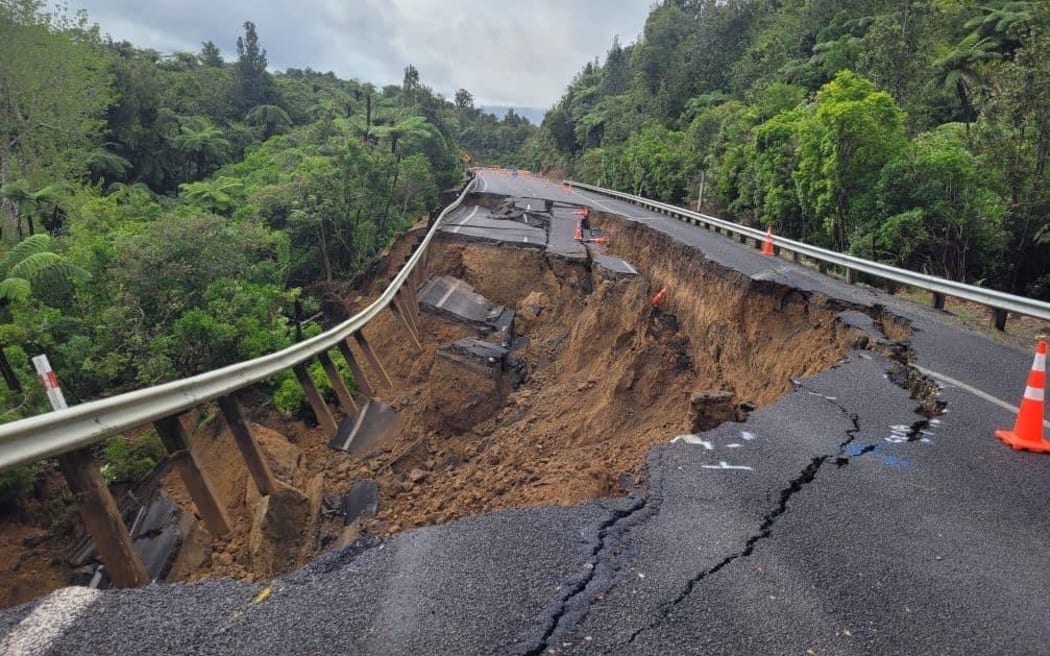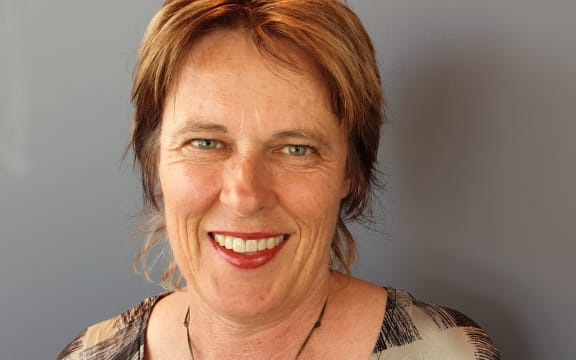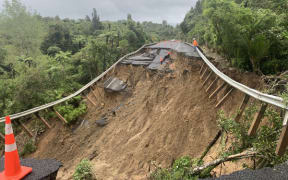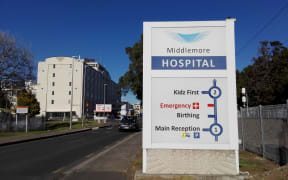
Parts of SH25A in Coromandel are no longer drivable. Photo: Waka Kotahi
Midwives on the storm-damaged Coromandel Peninsula are working to reduce the risk of babies being born on the side of the road, with the collapse of a key route to Thames and more torrential rain on the way.
Cyclone Gabrielle is expected to bring another round of road closures, with the already sodden region under a red heavy rain warning.
A massive slip left an abyss at the summit of State Highway 25A between Kopu and Hikuai last month, cutting the quickest link between Thames and towns like Whangamata and Whitianga for the foreseeable future.
Whitianga midwife Jocelyn Yates said the road closure meant it now took well over two hours - around double the usual drive-time - for women in labour to travel from Whitianga to Thames down the coast road, or through Whangamata, Waihi and Paeroa.
"We have only had to do that twice so far. It's really anxiety-provoking, they are obviously quite concerned about it," she said.
Coromandel women can give birth at home, the Thames Birthing Unit or Waikato Hospital.
While no one had given birth on the road since Yates moved to Whitianga in 2016, she said midwives were working hard to ensure no one made snap decisions as a result of State Highway 25A's closure, putting people in danger.
"Like perhaps trying to get across the 309 Road in the middle of the night and not being used to driving it, accidents, babies being born on the side of the road potentially, that could be a lot more likely.
"It would be very scary, everyone wants to avoid that, that's pretty much everyone's worst case scenario.
"There are lots of places on Coromandel that don't have any cellphone coverage, so you could be stuck in a spot in your car with your new baby who has just arrived without being able to contact anyone - but at least you can contact 111."
Midwives worked with women to reduce the risk of roadside deliveries, by doing thorough planning and assessments over the phone or calling for an ambulance if required, Yates said.
"We have had quite a few babies born in the back of an ambulance, but at least that's a safe space with other people around, it's warm and it's not dangerous.
New Zealand College of Midwives chief executive Alison Eddy said rural midwives were very organised, in constant communication with patients and always had travel back-up plans.
"They are very skilled in making sure they minimise the risk as much as possible," she said.
"If labour is really advanced, sometimes it might be safer to stay at home, even if that wasn't your plan. The midwife would be working with the woman and her family to make that assessment."
Women were more inclined to choose home births because they could not face the hours-long drive to Thames or Hamilton, Eddy said.

Alison Eddy. Photo: supplied
"There are a number of women who are choosing to stay and have home births when normally they perhaps would have gone through to Thames.
"The midwives are very prepared for that and have all the equipment and support that's needed, but it may not have been the family's first choice."
While some women chose to stay in Thames if a storm loomed around their due date, that was unaffordable for many whanau, Eddy said.
Staff shortages have also affected maternity care in the region, with women forced to divert from the Thames Birthing Unit to other services on four occasions last year. Te Whatu Ora said staff were currently on duty 24/7 at the unit, with cover for the next week.
Hamilton primary birthing centres have also agreed to host Coromandel women for whom it would be safer to travel ahead of labour and birth, with costs covered by Te Whatu Ora.
Waikato's hospital and specialist services interim director Chris Lowry said Te Whatu Ora had provided locum support for the five Coromandel lead maternity carers (LMCs) for the past year, involving two 48-hour periods of cover per month.The locum cover would continue until at least July.
She said Te Whatu Ora was trying to recruit up to six midwives for a Thames-based rural and remote midwifery caseload team to address staff shortages.
"As with many parts of the motu, maintaining the required number of LMCs is challenging, particularly in rural and remote areas," she said.
"We have taken steps as required to increase support utilising Te Whatu Ora clinicians. We believe the introduction of the rural and remote midwifery caseload team is a good step in providing long-term structure and choice for women wishing to have a baby in the Thames-Coromandel area."
An average 250 babies are born in the region every year.
National Emergency Management Agency message: Cyclone Gabrielle will impact much of the North Island with severe gales, heavy rain and very large waves forecast from today through to Tuesday.
This is expected to be an unprecedented and dangerous weather event.
MetService has issued severe weather warnings for many parts of the North Island.
Keep up to date with MetService weather warnings and advice from your local Civil Defence Emergency Management Group.
Adhere to all advice and instructions from authorities.
Cyclone Gabrielle will also exacerbate the impacts for those communities recovering from recent floods
Avoid travelling during severe weather, and check Waka Kotahi for road closures.
- Do what you can to prepare your household for the coming days.
- Information about preparing for storms can be found at getready.govt.nz.
- Call 111 if you feel in any danger.
Stay safe. Don't take any chances.




